Friday, March 09, 2007
TOTAL DENIAL- London Premier
 The groundbreaking film 'Total Denial' will be shown in London on Monday 26th March and Monday 28th March. Each showing starts at 6.30 and is £7 with proceeds going to Human Rights Watch.The film is a documentary following 15 villages who were used as slaves on Total's pipeline in Burma. They witnessed the relocation and rape before eventually bringing both Total and UNOCAL to Court. The documentary includes a collection of first hand testimonies collected at great risk to the film-makers own life. This is the London premier and the film-maker will be present at both showings.Full details at http://hrw.org/iff/2007/lo
The groundbreaking film 'Total Denial' will be shown in London on Monday 26th March and Monday 28th March. Each showing starts at 6.30 and is £7 with proceeds going to Human Rights Watch.The film is a documentary following 15 villages who were used as slaves on Total's pipeline in Burma. They witnessed the relocation and rape before eventually bringing both Total and UNOCAL to Court. The documentary includes a collection of first hand testimonies collected at great risk to the film-makers own life. This is the London premier and the film-maker will be present at both showings.Full details at http://hrw.org/iff/2007/london/films.html#total
Thursday, January 25, 2007
Ken Saro-Wiwa: A true hero
 Ken Saro-Wiwa, an Ogoni human rights activist and writer, devoted his life the peaceful struggle against Royal Dutch Shell and their rape if Nigeria. Thousands of Ogoni people saw their farms and livelihoods destroyed throughout the 1990's by Shell's irresponsible oil drilling, gas-flaring and murder of protestors. The accumulation of Shells barbaric practice came when they set up Saro-Wiwa and eight of his comrades to be executed by the corrupt Nigerian government in 1995.
Ken Saro-Wiwa, an Ogoni human rights activist and writer, devoted his life the peaceful struggle against Royal Dutch Shell and their rape if Nigeria. Thousands of Ogoni people saw their farms and livelihoods destroyed throughout the 1990's by Shell's irresponsible oil drilling, gas-flaring and murder of protestors. The accumulation of Shells barbaric practice came when they set up Saro-Wiwa and eight of his comrades to be executed by the corrupt Nigerian government in 1995.On 25th January Charles Lock will deliver a free lecture entitled: ‘The Legacy of Ken Saro-Wiwa: Heroic Activism and Rotten English’ at Goldsmith's, University of London. For full details visit the 'upcoming talks page' or contact Goldsmiths at 020 7919 7436, or e-mail m.macdonald@gold.ac.uk. For a map and travel information please visit http://www.goldsmiths.ac.uk/
Ken Saro-Wiwa is a true hero and an inspiration to us all in the peaceful yet unyielding fight against barbaric, human-rights abusing oil giants. He provides hope to those who continue the struggle against Shell in Nigeria and against Total in Burma. This lecture is an event not to be missed.
Monday, January 15, 2007
Jails and Genocide-Behind the Spin (part 2)
A particular venom has been saved for the Karen people; who the regime hate with such a passion that they have contributed a huge proportion of their resources to destroying the entire Karen civilisation. Hundreds of Karen villages have been bombed or shelled without w
 arning[1] killing men, women and children or soldiers have simply arrived and told the entire population of the village to move into army-controlled areas or be shot on site[2]. Just last month the Tatmadaw (Burmese army) attacked the Northern Karen region, murdering 76 men, women and children, burning villages, burning rice fields and driving 25 000 Karen civilians in to hiding in the jungle where they suffer from malnutrition, starvation and disease[3]. Children are executed to prevent the Karen population growing whilst those suspected of being members of the Karen National Liberation Army (a small armed group which seeks to protect Karen villages from attacks) have been beheaded in public or simply tied to trees and beaten to death[4].
arning[1] killing men, women and children or soldiers have simply arrived and told the entire population of the village to move into army-controlled areas or be shot on site[2]. Just last month the Tatmadaw (Burmese army) attacked the Northern Karen region, murdering 76 men, women and children, burning villages, burning rice fields and driving 25 000 Karen civilians in to hiding in the jungle where they suffer from malnutrition, starvation and disease[3]. Children are executed to prevent the Karen population growing whilst those suspected of being members of the Karen National Liberation Army (a small armed group which seeks to protect Karen villages from attacks) have been beheaded in public or simply tied to trees and beaten to death[4].The sickening brutality of the Burmese army is unquestionable as these quotes from the Free Burma Rangers show:
 “Saw Maw Keh carried his mother up the ridge out of the gully and into theclearing. The Burma Army soldiers waited until the Saw Maw Keh and hismother were in the cleared area, about 10-15 yards away from their positionbehind the logs, and then opened fire. The shock of having a line of troopsopen fire at point blank range must have been tremendous. Saw Maw Kehdropped his mother (we are not sure if she was shot off his back or fell).She cried out to him and as he turned to help her they both were shot dead.His daughter, 9-year-old Naw Eh Ywa Paw was shot though the back as she ranwith the rest of the people…The Burma Army waited ina prepared position to kill villagers. They waited until they were only 10yards away and opened fire on a man carrying his mother and as well as thefamilies and children behind him. What kind of people, what kind of systemcan do this? A depraved one.”[5]
“Saw Maw Keh carried his mother up the ridge out of the gully and into theclearing. The Burma Army soldiers waited until the Saw Maw Keh and hismother were in the cleared area, about 10-15 yards away from their positionbehind the logs, and then opened fire. The shock of having a line of troopsopen fire at point blank range must have been tremendous. Saw Maw Kehdropped his mother (we are not sure if she was shot off his back or fell).She cried out to him and as he turned to help her they both were shot dead.His daughter, 9-year-old Naw Eh Ywa Paw was shot though the back as she ranwith the rest of the people…The Burma Army waited ina prepared position to kill villagers. They waited until they were only 10yards away and opened fire on a man carrying his mother and as well as thefamilies and children behind him. What kind of people, what kind of systemcan do this? A depraved one.”[5]This is just one incident, in the attack on one village, that has been replicated time and time again not just across the Karen region but throughout the villages or nearly every ethnic minority in Burma.
Yet the murder of children, the pre-meditated destruction of entire villages, the savage beatings and the beheadings have been willingly funded and endorsed by Total Oil for fourteen years. Here are just two examples of Total’s contribution to the genocide:
Money from Total ($130 million) paid for 30% of the MIG fighter planes[6] that the Burmese Army purchased from Russia and for use in attacks on Karen villages. This transaction took place in 2002 despite the fact that the Burmese army had been carrying out their genocide of the Karen for years.
Soldiers drove Karen villagers from their homes to make way for Total’s pipeline. This was done with the full knowledge of Total, Chief Executive Theirry Desmarest stated “Military presence in the region was reinforced to ensure protection of the area”
The facts are clear. Despite Total’s spin and talk of ‘positive engagement’ propagated by their PR department, Total are funding genocide. They money paid by the public at Total petrol stations is in turn paid to the Burmese regime for Burma’s oil (£200 000 000 per year)[7].This money is used for military planes and arms to continue their genocide of Burma’s ethnic minorities (Total spend 50% of their annual budget on the military despite having no external enemies[8] –it all goes towards their oppression and genocide.

Total may create a fancy PR site with pictures of smiling Burmese children to cover their tracks but they know where the money is going. When asked about the genocide they are silent, when asked to condemn the genocide they are silent, and they’ll be silent tonight while tens of thousands of Karen civilians hide out in a landmine filled jungle to protect their children from the soldiers who will rape and murder them –with guns and planes paid for by Total.
[1] Karen Human Rights Group
[2] Karen Human Rights Group
[3] Free Burma Rangers
[4] Free Burma Rangers
[5] Free Burma Rangers
[6] Burma Campaign UK Report ‘Total Oil- Fuelling the Oppression in Burma’
[7] Burma Campaign UK Report ‘Total Oil- Fuelling the Oppression in Burma’
[8] Burma Campaign UK Report ‘Total Oil- Fuelling the Oppression in Burma’
Photo 1 from Karen Human Rights Group, Photos 2 and 3 from Free Burma Rangers.
Sunday, January 07, 2007
Total are still abusing human rights.....but we are still here
But as long as they carry on so will Students Against Total. We've spent the last year informing people, rasing awareness of the situation and lobbying Total both ont he ground and on the web. So get involved and get in touch by sending a message to studentsagainsttotal@hotmail.co.uk
We'll never give up on the people of Burma -and we'll never give up the fight against Totalitarian Oil.
Thursday, August 31, 2006
Total and the Environment (part 2)
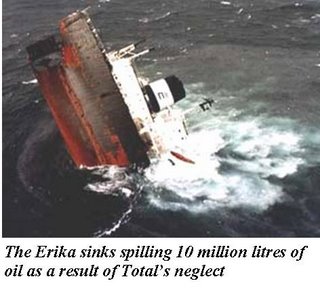 Erika is a name that has haunted Total since 1999 and has long been a symbol of Total’s complete disregard for the environment when in pursuit of profit.
Erika is a name that has haunted Total since 1999 and has long been a symbol of Total’s complete disregard for the environment when in pursuit of profit.In December 1999 the Erika tanker, commissioned by Total, split in two near the coast of France, spilling 10 million litres of oil into the ocean[1] , killing over 100 000 birds[2] (the biggest ever ecological disaster for Europe’s sea birds), destroying sea life and polluting over 500km of coast line[3].
Whilst civilians, soldiers, wildlife agencies and foreign aid flooded in to help save the birds and coastline, the finger of blame was pointed
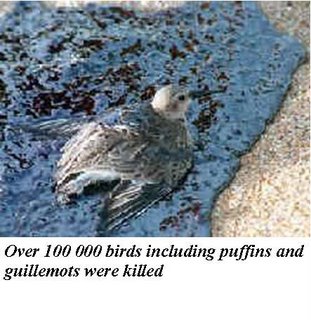 at Total for their appallingly lax safety standards.
at Total for their appallingly lax safety standards.An enquiry following the disaster revealed that Total was guilty of negligence in the vetting of the Erika, something that they were responsible for having commissioned the vessel to carry their oil. Lucien Bekourian, one of the commission’s experts, said the quality of Total's vetting was "clearly behind similar control processes in other companies". Bekourian said that Total used the Erika despite warnings about the quality of the ship.[4]
Total, in typical style responded with a weak claim that there were no international standards on vetting and they therefore did not bare responsibility.
The backlash revolved around a massive French-based campaign to boycott Total –the largest campaign of its sort before Total invested in Burma.
Environmentalists from France and further a field, many who had been involved in the enormous clean-up in the wake of Erika, criticised Total’s
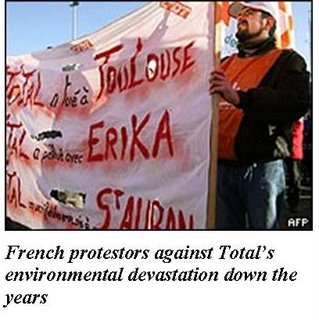 negligence and encouraged people not to buy from an oil company who wreaked such enormous devastation on Europe’s environment to save the money that would have been spent on vetting. Many still boycott Total as a result of the Erika atrocity, their resolve only strengthened by Total’s human rights abuses and environmental devastation in Burma.
negligence and encouraged people not to buy from an oil company who wreaked such enormous devastation on Europe’s environment to save the money that would have been spent on vetting. Many still boycott Total as a result of the Erika atrocity, their resolve only strengthened by Total’s human rights abuses and environmental devastation in Burma.Total failed to recover their reputation in France as just two years later their plant near Tolouse exploded killing 31 people, wounding 3000 and leaving tens of thousands homeless. Total were subsequently found guilt of neglect in storing dangerous chemicals at the site[5], a further illustration of Total’s utter neglect for both people and the environment; a character it has maintained across the world.
[1] BBC News
[2] Society for the Study and Protection of Nature (Brittaney)
[3] BBC News
[4] Asia Times
[5] Asia Times
Thursday, August 24, 2006
Jails and Genocide-Behind the Spin (Part 1)
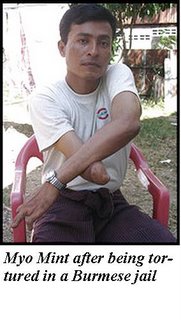 Total’s presence in Burma is shrouded in corporate lingo; ‘socio economic programmes’, ‘ethical guidelines’ and ‘constructive engagement’.
Total’s presence in Burma is shrouded in corporate lingo; ‘socio economic programmes’, ‘ethical guidelines’ and ‘constructive engagement’.But take away the corporate spin and take a look at what Total are really funding. Every year Total give over £200 000 000 ($450 000 000) to the Burmese regime in return for Burma’s oil[1]. Where does this go? Generally not on health (on which the regime spend just 19p per person each year, or 0.3% of their GDP-the lowest in the world[2]), most likely not on primary education (which isn’t available to 60% of children[3]) and almost certainly not on universities (the regime have closed down the majority of these). In fact the money isn’t really going to the people of Burma at all; 43% of children suffer from malnutrition and one in ten children die before their 5th birthday.
So let us take a look at where the majority of the regimes spending (coming foremost from Total) goes; on their prisons and on their genocide.
Currently 1183 political prisoners languish in Burma’s jails[4] where they are routinely tortured by the regime, who use the following methods:
- Piercing of skin
- Electric shocks (including to breast and genitals)
- Solitary confinement (in pitch black)
- Rape of men and women (by guards and trained dogs)
- Beatings
- Whippings
- Forcing prisoners to sleep in their own excretion
- Forcing prisoners to crawl on nails or glass
- Burning skin and eyes
- Rubbing skin off with iron bars
- Kicking
- Tying up
- Strangling
- Shackling[5]
Since 1988 126 democracy activists have been tortured to death in Burma’s jails. These people are imprisoned purely for their beliefs or for speaking out against the regime; many are reporters, one is a 4 year old girl, the youngest political prisoner in the world imprisoned because her father is a democracy activist[6].
As the regime spends such a large proportion of it’s income on arresting, detaining, torturing and executing democracy activists (and their families) and Total is the largest supplier of funds to the regime it is indisputable that much of the money Total pays them (coming from those filling up and Total petrol stations around the world) is used in Burma’s barbaric prison and torture system.
Total knows the situation –they know that their money is likely spent on the torture, rape and murder of political prisoners (aged four to eighty) in Burma’s notorious jails; yet they have never once made any objections. We call on Total to:
- Request none of it’s money paid to the regime is spent on detention, jails or torture
- Use it’s influence and the largest foreign investor in Burma and largest supplier of funds to the regime and condemn the prison and torture situation, call on the regime to reform the system and ensure nobody is arrested or jailed for opposition to Total’s pipeline
What can we do?
So far Total has never condemned the torture it funds or even attempted to make a difference, but with public pressure we can change that:
- Please click ‘Add a Comment’ and sign your name in support of this request to Total
- Please also e-mail Total at holding.myanmar-contact-internet@total.com or Total’s PR man at Jean-Francois.LASSALLE@total.com with this request (please send us copies of your e-mail and any replies at studentsagainsttotal@hotmail.com)
Thank you
[Part 2 will focus on Total’s funds being used in the genocide of the Karen people and the persecution of other ethnic groups]
[1] Burma Campaign UK Report ‘Total Oil- Fuelling the Oppression in Burma’
[2] Burma Campaign UK Report ‘Total Oil- Fuelling the Oppression in Burma’
[3] Burma Campaign UK Report ‘Total Oil- Fuelling the Oppression in Burma’
[4] Human Rights Watch
[5] List from AAPP report ‘The Darkness we see’
[6] Indo-Burma News
Students Against Total
Totalitarian Oil http://totalitarian-oil.blogspot.com
studentsagainsttotal@hotmail.co.uk
Saturday, August 19, 2006
Human Rights Abuses in Burma (part 7)
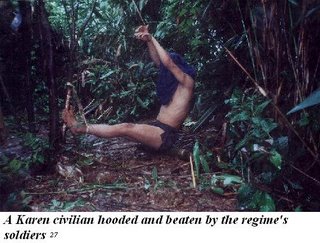 government to impose unilateral sanctions, an action mirrored by the government of Norway. Significant investors have withdrawn from Burma, with Total Oil the largest remaining foreign investor and coming under increasing pressure.
government to impose unilateral sanctions, an action mirrored by the government of Norway. Significant investors have withdrawn from Burma, with Total Oil the largest remaining foreign investor and coming under increasing pressure.Since Archbishop Desmond Tutu and former Czech Republic President Václav Havel submitted a document outlining the need for UN intervention in early 2006 the Security Council has held it’s first ever discussion regarding Burma-an enormous step forward. Pressure from both politicians and the public is mounting on the UN to intervene and groups such as Burma Campaign UK are growing in support. There is still much to be done, however, to save the sixty million people of Burma from some of the worst abuses humankind has ever seen.
[Photo] Karen Human Rights Group